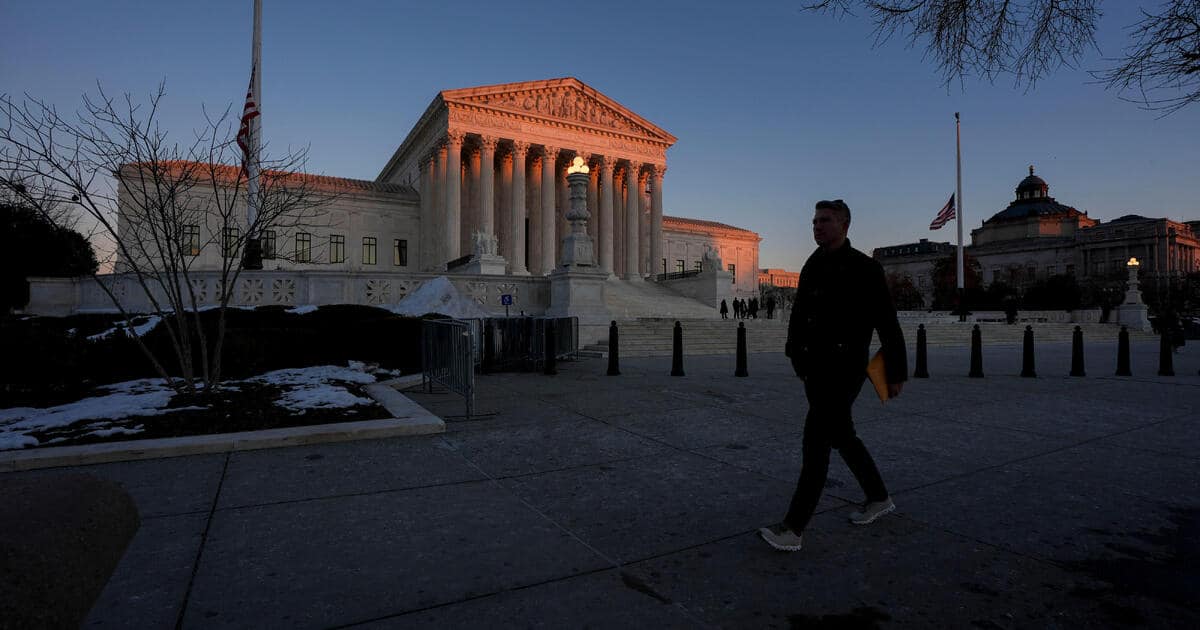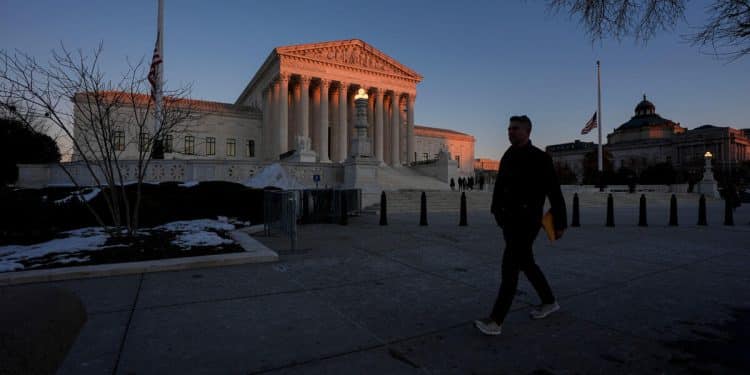
Washington — The Supreme Court will hear arguments Wednesday in an Ohio woman’s bid to revive a lawsuit alleging “reverse discrimination” after she said she was denied a promotion and demoted because she is straight.
The case centers on what a plaintiff alleging a violation of Title VII of the Civil Rights Act must prove. Marlean Ames, the woman who brought the case, argues that a “background circumstances” requirement adopted by some lower courts unfairly imposes a higher burden on her as a heterosexual woman. The standard requires plaintiffs who are members of a majority group to put forth more evidence to show that their employer discriminated against them.
The Supreme Court, which has a 6-3 conservative majority, is reviewing the case as President Trump has taken sweeping actions to dismantle diversity, equity and inclusion, or DEI, programs and policies throughout the federal government and fired workers overseeing the initiatives.
In the private sector, large companies like McDonald’s, Ford and Walmart have walked back their DEI initiatives in recent months in the wake of the Supreme Court’s 2023 decision ending affirmative action in college admissions. That landmark ruling prompted more lawsuits from conservative groups targeting diversity initiatives at corporations.
Conservative legal groups like the America First Legal Foundation are backing Ames in the case and have warned that the background circumstances rule forces courts to decide who is a member of a majority group. America First Legal Foundation was founded by Stephen Miller, who now serves as White House deputy chief of staff.
“The central problem is how to decide who is the ‘majority’ and who is the ‘minority,'” the group, which has sued companies over their diversity policies, wrote in a filing with the Supreme Court. “Surprisingly, courts have given this issue almost no attention, generally assuming that ‘white men’ (and, as below, heterosexuals) are the majority, and everyone else the minority.”
But others such as the NAACP Legal Defense Fund said that Ames is asking the court to “interpret Title VII in a way that ignores the realities of this country’s persisting legacy of discrimination in evaluating disparate treatment claims.”
“Today, just as when Congress enacted Title VII, Black people and members of other marginalized groups are far more likely to endure employment discrimination than their majority-group counterparts,” the group wrote.
Allegations of reverse discrimination
Ames started working at the Ohio Department of Youth Services, the state’s juvenile corrections system, in 2004 as an executive secretary and became a program administrator in 2014. During her time in that role, she received positive performance reviews, according to court filings.
Ames applied for a promotion to bureau chief of quality assurance and improvement in 2019, but didn’t get the job. Her supervisor, Ginine Trim, who is gay, said Ames and two others who applied failed to lay out their vision for the role, according to court filings from Ames’ legal team.
The position remained unfilled for months and eventually was offered to a gay woman who had been with the department for less time than Ames, her lawyers said in court papers. The woman didn’t interview or apply for the job, and was less qualified than Ames, according to the attorneys.
After Ames was denied the promotion, she was removed from her position as program administrator and told she could either return to her job as executive secretary or be fired. Accepting the demotion, though, would mean a significant pay cut — from $47.22 an hour to $28.40, according to court filings.
Still, Ames chose to go back to her role as executive secretary and was replaced as program administrator by a gay man, her lawyers said.
Ames sued the Department of Youth Services and alleged violations of Title VII, which prohibits employment discrimination based on race, religion, national origin and sex, which includes sexual orientation. Ames argued the department discriminated against her on the basis of sexual orientation.
A federal district court ruled for the Ohio Department of Youth Services, finding that the department offered “legitimate, nondiscriminatory business reasons” for passing Ames over for the promotion. The court also concluded that she failed to satisfy the “background circumstances” requirement.
Imposed by some courts, the standard requires a plaintiff who is a member of a majority group to show “background circumstances” that “support the suspicion that the defendant is that unusual employer who discriminates against the majority,” or engages in reverse discrimination.
Plaintiffs can make that showing by presenting evidence that a member of the relevant minority group — gay people, in Ames’ case — made the employment decision at issue, or by presenting statistical evidence demonstrating a pattern of discrimination by the employer against members of a majority group.
Ames asked the U.S. Court of Appeals for the 6th Circuit to review the district court’s decision. The appeals court also found that she failed to satisfy the “background circumstances” requirement and threw out her case.
The three-judge panel first said that the decisions about Ames’ positions were made by the department’s director and assistant director, who are heterosexual. The 6th Circuit also found that Ames’ only evidence of a pattern of discrimination was her own experience.
The Supreme Court agreed in October to take up Ames’ case. In filings with the Supreme Court, her lawyers argued that the “background circumstances” test infringes on the text of Title VII, Supreme Court precedent and the Equal Employment Opportunity Commission’s own practices.
They said the standard effectively adds words to the text of Title VII and imposes a new requirement on certain plaintiffs alleging employment discrimination — those in a majority group. Ames’ lawyers also argued that the background circumstances requirement forces courts to draw lines that intentionally treat some plaintiffs less favorably because of protected characteristics.
“That sort of line drawing does not eradicate discrimination. It perpetuates it,” they wrote.
Additionally, the lawyers noted that Ames would still have to demonstrate before a jury that she was intentionally discriminated against, but was “robbed” of the chance to do so because of the “background circumstances” requirement.
But lawyers for the Ohio Department of Youth Services reiterated in a filing that the officials who made decisions about Ames’ employment are straight and provided a nondiscriminatory reason for replacing her as program administrator: concerns about her vision for the department.
The “background circumstances” requirement, Ohio Attorney General Dave Yost wrote, is just another way of determining whether the circumstances surrounding an employment decision suggest that decision was because of a protected characteristic.
The issue, Yost said, is how Ames decided to litigate her case, which he called “fatal” to her discrimination claim.
“At the end of the day, Ames has not identified a single piece of evidence that suggests that sexual orientation played any role in the hiring decision at issue in her promotion claim,” the state argued.
Ohio officials said the background circumstances standard protects against “meritless” Title VII claims, which can “impose ruinous costs, especially on smaller businesses, that ultimately reduce employment, incent automation, and inflate prices for consumers — or consume Ohioans’ tax dollars.”
“Maintaining a robust threshold step, by comparison, ensures that many specious or vexatious Title VII lawsuits die on the desk of busy plaintiffs’ lawyers,” Yost argued.
In a friend-of-the-court brief filed in December, the Biden administration argued the 6th Circuit was wrong to apply a heightened requirement that it said would foreclose some claims that would satisfy Title VII’s standard for liability. The previous administration urged the Supreme Court to toss out the lower court’s decision and send the case back for more proceedings.
The Trump administration has not indicated that the government’s position in the case has changed. A lawyer from the Justice Department will be participating in the argument alongside lawyers for Ames and the Ohio Department of Youth Services.







